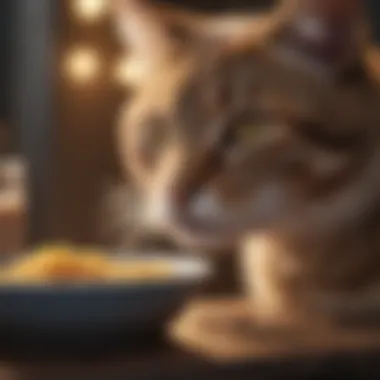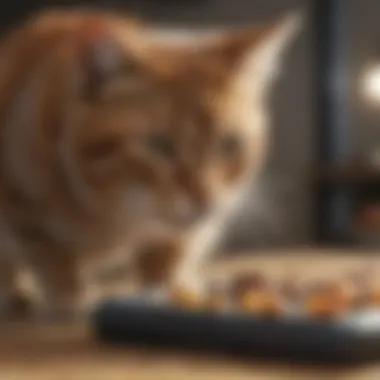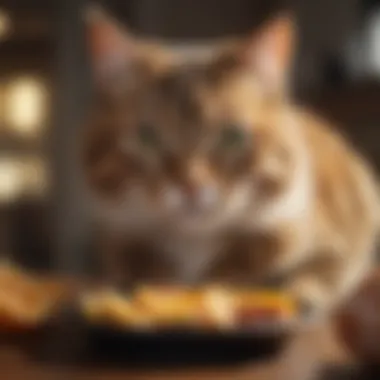Optimal Feeding Times for Cats: Enhancing Feline Health and Happiness


Pet Care Essentials
Behavior & Training
When it comes to feeding times, understanding your cat's body language plays a vital role. Cats communicate their hunger, satisfaction, and comfort through subtle gestures and postures. By being attuned to these cues, you can establish a feeding routine that resonates with your cat's natural instincts and preferences. Basic training techniques can also be intertwined with feeding times to reinforce positive behaviors and manners. Addressing behavioral concerns related to feeding can enhance the overall feeding experience for both you and your feline companion.
Pet Home Environment
Creating a conducive and pet-friendly space for feeding is pivotal for your cat's well-being. Ensuring a safe and comfortable feeding area free from distractions can promote healthy eating habits in your cat. Understanding safety measures and hazards to avoid during feeding times can prevent accidents and issues. Choosing the right toys and accessories to engage your cat before or after meals can enrich their feeding experience. Additionally, setting up a cozy resting area where your cat can relax post-meal is essential for their comfort and contentment.
Pet Health Issues
Recognizing signs of illness during or after feeding is crucial for early intervention. Monitoring your cat's appetite, digestion, and behavior can provide valuable insights into their health status. Implementing preventative care measures such as regular vet check-ups and a balanced diet can contribute to your cat's overall well-being. Familiarizing yourself with common ailments that may affect your cat and their respective treatments is essential for proactive pet care. Being prepared for emergencies during feeding times is a critical aspect of responsible pet ownership.
Introduction
Factors Influencing Feeding Times
1. Cat's Natural Instincts
A cat's natural instincts are deeply rooted in their evolution as hunters and carnivores. This innate behavior influences not only what they eat but also when they prefer to eat. Cats are crepuscular animals, meaning they are most active during dawn and dusk. Their feeding times should align with this natural rhythm to mimic their hunting patterns and ensure they receive the energy they need when it's most beneficial. By understanding and respecting your cat's natural instincts, you can create a feeding schedule that harmonizes with their biological clock.
2. Age of the Cat
Another crucial factor that affects feeding times is your cat's age. Kittens, for instance, have high energy requirements and may need more frequent meals throughout the day. As cats mature, their metabolism and activity levels may change, influencing the timing and portion sizes of their meals. Senior cats, in particular, may require adjustments to their feeding schedule to accommodate age-related changes in their digestive system and health. Tailoring feeding times according to your cat's age ensures they receive the nutrition and sustenance appropriate for their life stage.
3. Cat's Activity Level


The activity level of your cat also plays a significant role in determining the optimal feeding times. Active and playful cats may burn more calories and require more frequent meals to sustain their energy levels. In contrast, sedentary cats or those with health conditions that limit their mobility may require fewer meals to prevent overfeeding and maintain a healthy weight. By considering your cat's activity level when establishing their feeding schedule, you can provide them with the right balance of nutrition to support their lifestyle and well-being.
Factors Influencing Feeding Times
Feeding times for cats play a crucial role in their overall health and well-being. Understanding the various factors that influence feeding times is essential to create a balanced and healthy routine for your feline friend. By considering specific elements such as a cat's natural instincts, age, and activity level, you can determine the optimal feeding schedule that meets their nutritional needs and promotes their overall health.
Cat's Natural Instincts
A cat's natural instincts have a significant impact on their feeding behavior. Cats are carnivorous animals with a hunting instinct, which influences their feeding patterns. Understanding your cat's natural instincts can help you establish a feeding schedule that aligns with their biological needs. By recognizing that cats prefer smaller, frequent meals throughout the day, you can provide a feeding routine that mimics their instinctual eating behavior. This approach not only satisfies their hunting instinct but also promotes healthy digestion and prevents overeating.
Age of the Cat
The age of your cat is another crucial factor to consider when determining feeding times. Kittens, adult cats, and senior felines have varying nutritional requirements based on their age and life stage. Kittens, for instance, require more frequent feeding sessions due to their rapid growth and high energy levels. As cats transition into adulthood, their feeding schedule may change to accommodate their evolving metabolism and activity levels. Senior cats, on the other hand, may benefit from smaller, more frequent meals to support their aging digestive system. Tailoring feeding times according to your cat's age ensures they receive the appropriate nutrients and calories needed for their life stage.
Cat's Activity Level
A cat's activity level is a critical aspect to consider when establishing feeding times. Active and playful cats may require additional feeding sessions to sustain their energy levels and support their daily activities. In contrast, sedentary cats or those with lower activity levels may need fewer meals to prevent weight gain and promote weight management. By observing your cat's activity patterns and energy levels, you can adjust their feeding schedule to meet their individual needs. This tailored approach not only prevents overfeeding but also ensures that your cat maintains a healthy weight and stays active throughout the day.
Morning Feeding
Benefits of Morning Feeding
Feeding your cat in the morning comes with a myriad of benefits that cater to their natural instincts and metabolic needs. A morning meal can aid in regulating your cat's circadian rhythm, promoting healthy digestion, and sustaining energy levels throughout the day. By offering a nutritious breakfast, you facilitate muscle growth, cognitive function, and overall well-being for your feline companion.
Ideal Time for Morning Feeding
Determining the ideal time for morning feeding requires understanding your cat's routines and preferences. Generally, cats are crepuscular hunters, making the early morning hours an optimal feeding window. Consider aligning the feeding time with your cat's wake-up routine to foster a sense of consistency and comfort. Providing breakfast within the first few hours of your cat's active period ensures they receive the necessary nutrients to engage in their daily activities.


Morning Feeding Tips
To enhance the morning feeding experience for your cat, consider offering a balanced diet that meets their nutritional requirements. Avoid abrupt changes in feeding times to prevent digestive upset and maintain a stable eating routine. Additionally, providing fresh water alongside their meal promotes hydration and supports overall health. Observing your cat's behavior and appetite cues can help personalize their feeding schedule, ensuring they receive adequate nourishment and care.
Afternoon Feeding
When it comes to optimizing the feeding times for your beloved feline friend, understanding the significance of the afternoon feeding session is crucial. This section delves into the specific elements, benefits, and considerations associated with afternoon feeding. By dissecting the afternoon feeding routine, you can ensure that your cat's nutritional needs are met adequately throughout the day, promoting overall health and well-being.
Benefits of Afternoon Feeding
The afternoon feeding session plays a pivotal role in providing sustained energy levels for your cat during the second half of the day. By offering a balanced meal during this time, you can prevent energy slumps and help maintain your cat's activity levels. Additionally, afternoon feeding can help regulate your cat's metabolism and promote proper digestion, contributing to better nutrient absorption and overall digestive health.
Ideal Time for Afternoon Feeding
Determining the ideal time for afternoon feeding depends on your cat's individual schedule and needs. Ideally, scheduling the afternoon meal around midday or early afternoon can align with your cat's natural feeding instincts. This timeframe allows your cat to refuel after the morning activities and provides the necessary energy for afternoon playtime. Observing your cat's hunger cues and behavior can help pinpoint the most suitable time for afternoon feeding.
Afternoon Feeding Tips
To optimize the afternoon feeding experience for your cat, consider offering a mix of wet and dry food to cater to different preferences. Ensure that fresh water is readily available alongside the meal to support hydration. It's also advisable to feed your cat in a quiet and peaceful environment to minimize distractions and promote a stress-free dining atmosphere. Monitoring your cat's portion sizes and adjusting according to activity levels can help prevent overfeeding and maintain a healthy weight. By incorporating these tips, you can enhance your cat's afternoon feeding routine for optimal health and satisfaction.
Evening Feeding
Evening feeding plays a pivotal role in the overall health and well-being of your cat. This section delves into the specific nuances of feeding your feline companion during the evening hours. Understanding the significance of this feeding time is crucial in ensuring your cat's nutritional requirements are met adequately.
Benefits of Evening Feeding
Evening feeding offers several advantages that contribute to your cat's physiological and behavioral welfare. One key benefit is that it helps regulate your cat's metabolism during the night, providing a steady source of energy. Additionally, feeding in the evening can promote relaxation and contentment in your cat, aiding in a restful sleep. By providing a nutritious meal during this time, you support your cat's overall health and weight management.


Ideal Time for Evening Feeding
Determining the ideal time for evening feeding depends on various factors, including your cat's daily routine and activity levels. Ideally, feeding your cat 2-3 hours before bedtime is recommended. This timing allows your cat to digest the food properly before settling down for the night. Observing your cat's behavior can help pinpoint the best time for their evening meal, ensuring they are satisfied and comfortable throughout the night.
Evening Feeding Tips
When planning your cat's evening meals, consider offering a balanced diet that meets their nutritional needs. Avoid free-feeding in the evening to maintain a consistent feeding schedule. It's advisable to provide a mix of wet and dry food options to cater to your cat's preferences. Additionally, ensure access to fresh water at all times. Monitoring your cat's weight and adjusting portion sizes accordingly is essential for their overall health. By incorporating these tips into your evening feeding routine, you can promote a healthy and happy lifestyle for your beloved feline companion.
Frequency of Feeding
Feeding frequency is a pivotal aspect of feline care that significantly impacts your cat's health and well-being. Establishing a consistent feeding schedule not only regulates your cat's metabolism but also creates a sense of routine and security for your pet. Cats thrive on predictability and structure, making a regular feeding schedule crucial for their overall happiness and contentment. By adhering to a set feeding routine, you can help prevent digestive issues, maintain healthy energy levels, and promote a strong bond with your furry friend.
Importance of Consistent Feeding Schedule
Maintaining a consistent feeding schedule is paramount in ensuring the optimal health of your cat. Cats are creatures of habit, and deviations in their feeding times can lead to stress and anxiety. Consistency in feeding establishes a sense of security for your feline companion, as they learn to rely on and anticipate their meals at specific times. Moreover, a steady feeding schedule regulates your cat's digestive system, preventing issues such as vomiting or obesity. By sticking to a routine, you provide your cat with stability and comfort, fostering a positive environment for them to thrive.
Tailoring Feeding Times to Your Cat's Needs
Every cat is unique, with individual dietary requirements and preferences. When tailoring feeding times to your cat's needs, consider factors such as age, activity level, and health status. Kittens, for instance, may require more frequent meals due to their fast metabolism and growth rate, while senior cats might benefit from smaller, more frequent feedings to aid digestion. Observe your cat's eating habits and energy levels to determine the best feeding schedule that suits their lifestyle and dietary needs. By customizing feeding times according to your cat's specific requirements, you can ensure they receive the nutrition and care essential for their well-being.
Avoiding Overfeeding
Overfeeding poses significant health risks for cats, including obesity, digestive issues, and overall decreased quality of life. It is crucial to feed your cat according to their individual needs and body condition score to prevent overconsumption of food. By carefully monitoring your cat's portion sizes and adjusting feeding times accordingly, you can avoid overfeeding and maintain their ideal body weight. Remember, providing love and attention is essential, but expressing affection through food can lead to detrimental effects on your cat's health. Be mindful of portion control and ensure your cat's dietary intake aligns with their energy requirements to promote a long and healthy life.
Conclusion
Undoubtedly, one of the paramount considerations regarding the conclusion drawn from this narrative is the paramount emphasis placed on consistency and routine. Cats, being creatures of habit and discerning precision, thrive when provided with a predictable routine, especially when it pertains to their dietary schedule. When we establish a consistent feeding pattern, we convey a sense of security to our feline friends, fostering a conducive environment for optimal digestive functioning and metabolic regulation.
Moreover, the art of tailoring feeding times to meet the individual needs of each cat underscores the tailored approach necessary for responsible pet ownership. Just as each feline possesses a unique personality and disposition, so too should their feeding regimen be customized to accommodate their specific requirements. By discerning the subtle cues and dietary preferences of our cats, we demonstrate our commitment to their holistic well-being, promoting a harmonious coexistence fueled by culinary satisfaction.
Furthermore, the imperative task of avoiding overfeeding emerges as a critical facet encapsulated within the broad spectrum of optimal feeding times. Overindulgence in food not only jeopardizes the physical health of our cats, but it also encroaches upon their emotional equilibrium. By exercising prudence and restraint in portion control, we uphold the sanctity of our cat’s dietary discipline, ensuring that their nutritional intake aligns harmoniously with their metabolic demands.
In essence, the conclusion encapsulates a holistic approach to nurturing our cherished feline companions through the prism of optimal feeding times. By extrapolating the nuanced dynamics of feeding routines, personalized adjustments, and portion management, we embark on a journey towards fostering a symbiotic relationship characterized by vitality, happiness, and mutual understanding. Embracing the revelations unearthed in this elucidative discourse, we fortify our bond with our cats, nurturing a winsome relationship founded on attentiveness and conscientious care.







